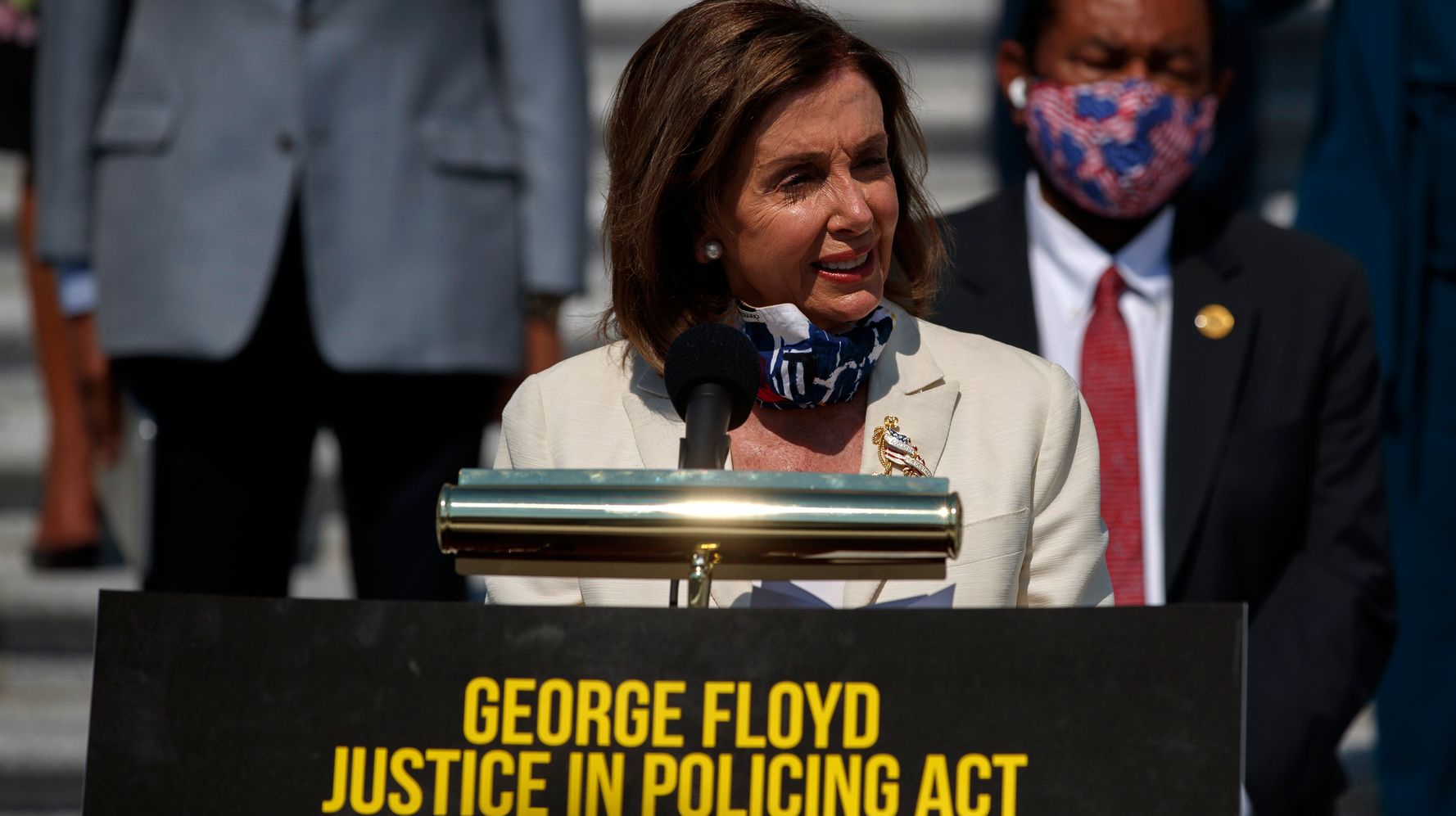[ad_1]

WASHINGTON ― Exactly one month after George Floyd was killed in police custody, House lawmakers returned to the Capitol on Thursday to pass a sweeping police reform bill in Floyd’s name.
The bill ― the George Floyd Justice in Policing Act of 2020 ― passed largely along party lines, 236-181, with all Democrats and three Republicans voting yes, and 180 Republicans and independent Justin Amash of Michigan voting no.
Speaker Nancy Pelosi (D-Calif.) said Thursday that the House was honoring Floyd’s life “and the lives of all those killed by police brutality, and pledging: Never again.”
Pelosi said the legislation would fundamentally transform the culture of policing to address systemic racism, curb police brutality and bring accountability to police departments.
“It will save lives,” she said.
But, as Republicans repeatedly reminded Democrats on Thursday, the bill is highly unlikely to become law.
The measure is a collection of a number of policing proposals composed by the Congressional Black Caucus and written in conjunction with Black Sens. Cory Booker (D-N.J.) and Kamala Harris (D-Calif.).
The bill would ban chokeholds for federal police and the use of “no-knock” warrants — which enable law enforcement to enter a property without notifying the owner ― in federal drug cases, and would make federal money for state and local governments contingent on establishing similar policies.
The legislation would also establish a national registry of police misconduct. It would end the practice of qualified immunity, which prevents citizens from suing individual officers in civil courts. And it would forbid money going to police departments that have not implemented policies to eliminate racial profiling.
Republicans take issue with some of those changes, and many have made it clear they absolutely won’t go along with ideas like ending qualified immunity. Republicans have their own bill ― written in the Senate by Black Republican Tim Scott of South Carolina ― that differs in a number of ways from the House bill.
Scott’s bill would ban chokeholds meant for “incapacitation” but would allow them when federal guidelines authorize deadly force, such as when someone is holding a gun. The House bill would simply ban chokeholds and classify them as a civil rights violation.
Scott’s bill would require all law enforcement agencies to report their use of “no-knock” warrants to the attorney general. The House bill would outright end “no-knock” warrants.
And Scott’s bill wouldn’t address qualified immunity at all.
“That bill has about as much teeth as a newborn baby,” Rep. Cedric Richmond (D-La.), a former chairman of the CBC, said on the House floor Thursday in reference to the Senate measure.
“There is a difference of policing in this country, and we’re just asking to fix it,” Richmond added.
That [Senate] bill has about as much teeth as a newborn baby.
Rep. Cedric Richmond (D-La.)
On Thursday, a number of Black representatives referenced having “the talk” with their children — instructing them to do whatever the police say and to prioritize their safety at the expense of their rights.
“I had to have the talk with my two sons. And I knew what to say, word for word, because my father had the same talk with me decades ago,” Rep. Hakeem Jeffries (D-N.Y.) said. “And nothing has changed.”
Instead of addressing these issues, Republicans focused on procedural and political complaints with the policing bill. They argued that, if Democrats were serious about producing a measure that could pass the GOP-controlled Senate and get President Donald Trump’s signature, they would have allowed amendments to the House bill and wouldn’t have blocked the Senate from taking up Scott’s bill in that chamber on Wednesday.
Republican Rep. Dan Crenshaw of Texas said there was a lot of agreement in the bill, and when he first read the legislation, he was “pleasantly surprised.”
“If we voted on this section by section, I believe there are sections where there would be an overwhelming bipartisan majority for some necessary and crucial reforms,” Crenshaw said. “There’s other parts where, if we just worked together and made some changes, we’d likely get to yes on a lot of these.”
But, Crenshaw said, while the bill doesn’t defund the police, it would lead to less policing.
Other Republicans were more direct in their criticism. Many said reforms like ending qualified immunity would lead to a rash of police resignations, and many just made general comments about how all lives matter.
“White lives matter. Hispanic lives matter. Asian lives matter. Native American lives matter. Quite frankly, all lives matter. Police officers’ lives matter, too,” Rep. Debbie Lesko (R-Ariz.) said.
Those sorts of arguments didn’t warrant much of a rebuttal from Democrats, but Democratic leaders did address arguments about process, countering that Republicans were the ones uninterested in a bill becoming law.
Judiciary Chairman Jerrold Nadler (D-N.Y.) detailed how Democrats had offered the bill 18 days ago, asked Republicans if they would support the legislation if they adopted their amendments, and asked to see the amendments Republicans planned to offer before the Judiciary Committee markup so that they could potentially work with them on specific language to address their concerns.
But Republicans wouldn’t share the text, and the Trump administration has yet to reach out to try and work with Democrats.
“If there were a serious and good faith effort to enact legislation, the White House would seek to work with both sides of the aisle, and both sides of the Capitol. That has not happened thus far,” Nadler said.
The bill will now wait for Senate action, as Senate Majority Leader Mitch McConnell (R-Ky.) has made it clear he won’t take up the House bill.
House Majority Leader Steny Hoyer (D-Md.) suggested the Senate pass its bill and that the two chambers go to a conference committee to work out their differences. He said that the House bill’s lead author, Congressional Black Caucus Chairwoman Karen Bass (D-Calif.), had told him she was more interested in a bill that could become law than a political messaging device.
As it stands now, however, Senate Democrats say Scott’s bill is unworkable and that their concerns can’t be addressed by amendments.
With Republicans and Democrats unwilling to bend either way, it’s likely that no police reforms will pass in the remaining six months of this Congress.
Calling all HuffPost superfans!
Sign up for membership to become a founding member and help shape HuffPost’s next chapter
[ad_2]
Source link

